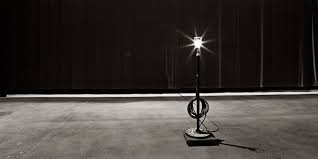Thanks for visiting my little series on life lessons from the theatre! Each day I'll share a new idea or insight I've had during this production that is giving me food for thought on how to approach my life offstage. If you missed the first post, you can find Life Lesson #1: Show Up With What You Have and Use It Well HERE.
During my time in college, all the performance and technical theatre majors were required to spend a certain number of production hours working in an area that was not their focus. That's how I found myself, a performance major, suddenly painting sets, searching for props for a play set in the 1960's, and organizing the scenic shop during a strike. During that time and since, I've heard some actors and technical theatre practitioners alike lament the requirement to try their hand at an area of theatre that's unfamiliar to them. "It's a waste of time", some of them say, or "I'm going to New York to be an actor after college, so I don't understand why I need to help with striking a set."
Although there were times I have felt out of my element being up on a Genie stapling fabric leaves to tall columns (Into the Woods) or explaining to an elderly patron how a hearing aid device works, I have learned so much from these experiences and wouldn't trade them for anything. In fact, every time I've taught students in any setting, I require them to assist with a part of the production that isn't their area of interest or expertise. I love watching them start off unsure, perhaps even disinterested, and come away feeling a whole new respect for what everyone does to make a play happen. It's so valuable to feel out of your element from time to time, to be willing to be a beginner at something. It's how we find out what we're capable of, and how we discover new passions.
When you get a new perspective, you understand that everyone matters. Every single person matters. Yes, an audience sees actors onstage during a play, but only because the lighting designer has lit them so well. We can move around in our costumes because the costume designer has made sure our clothes are both beautiful and functional. The stage floor is clear of stray nails and staples because someone sweeps it every night before and after the show. Without the house manager, the show wouldn't start on time, and without the ushers, no one would get a program. Ever thought about running a show without a stage manager? Good luck. If any of these parts were missing, the show would suffer. Theatre is the essence of teamwork and while you don't have to be a jack of all trades, it pays to step into another role every now and then. Doing this gives you a different vantage point, and ultimately strengthens our sense of community.
This is an interesting way to look at things we do every day. We tend to get on the bus in the morning without looking at the bus driver, but it's amazing when you realize you wouldn't get to wherever you're going without him or her. Next time you go to buy a cup of coffee, notice that it's not just the barista that made your morning cup of joe possible, but everyone from the farmer who grew the coffee beans to the person mopping the floor every evening.
And lastly, recognize that you are part of the team, and what you do matters. You start to understand that regardless of how large or small your role feels in the giant machine, you are just as important to the outcome as all the other cogs and wheels. I think in an age of infinite Facebook followers, Tweeters, and LinkedIn connections, any opportunity we can get to see ourselves and others as not just another number but as a whole, valuable human being is an opportunity we should take.
What role changed your perspective?
Next up tomorrow is Life Lesson #3: Be Playful and Laugh at Yourself.

